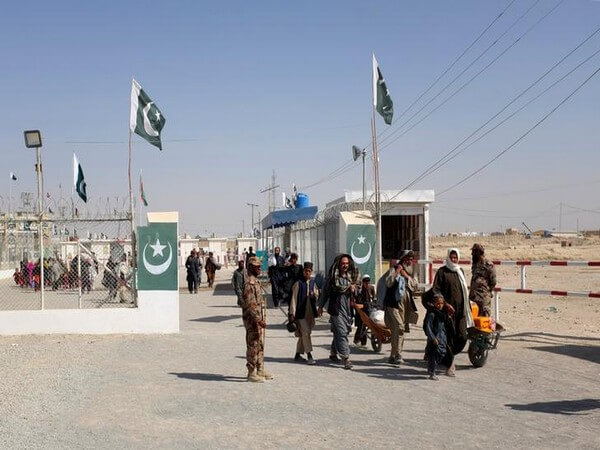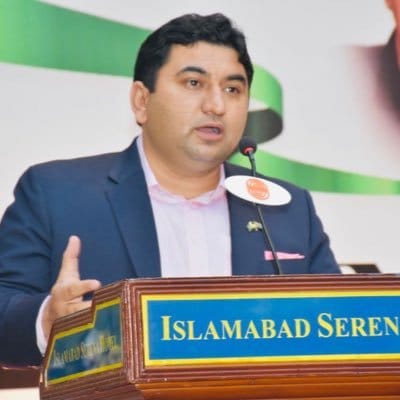
Fire in Afghanistan Can Travel to Pakistan Too!
Mon, 30 Aug 2021 | Reading Time: 6 minutes

Qamar Cheema
Afghanistan’s socio-cultural fabric has been long broken because of constant wars and a ‘revolving door’ political system. The fall of Ashraf Ghani’s government and the failure of Afghanistan’s institutional apparatus, to protect their public and the constitution has once again exposed this broken social fabric. The Afghan society today is facing dire challenges with the revival of the Taliban in Afghanistan, because the Afghans were promised democracy and a progressive political system, that would make them respectable members of international society.
The Taliban that entered Kabul by force on 15 August 2021, wants to bring a new social contract for the people of Afghanistan. This will be a top-down approach. People will not be consulted for a new constitution and they will have to live, as they will be asked to live. The jittery political environment and uncertainty since the start of this year, have resulted in more than 600,000 people having been displaced.
According to the United Nations Office for the Coordination of Humanitarian Affairs, (UNOCHA) 80% of these displaced people are women and 59% are children. More than 3.5 million people were already displaced of which the majority is of women and children. Out of the 38 million population of Afghanistan more than 14 million people are facing food insecurity because of years of drought, economic deterioration, and conflicts.
With such a bad state of affairs in Afghanistan, where the society has collapsed socially, politically, and economically, it is Pakistan that will have to face the consequences of an uncertain political environment in Afghanistan. Pakistan can deal with the security challenges, as Pakistan’s security establishment has time and again assured that security measures are adequate for dealing with any kind of challenges.
But with such a mass level of mobilization along the 2600 km long border between Afghanistan and Pakistan, it will have consequences for Pakistan. More than 27,000 people have already entered Pakistan via Torkham and Chaman borders, whereas 4400 people were evacuated by Pakistan.
There could be many socio-cultural implications of Afghanistan’s present situation, on the Pakistani society, which is already fragile for any religious-ideological intervention. Pakistan will have to look into five areas for making the social fabric strong and to avoid any influence of Afghanistan’s current situation in Pakistan.
The first major challenge is transnational nationalism, which gives space to sub-nationalism and also an opportunity to some socio-political forces, to challenge the idea of the Pakistani state. Previous Afghan governments did not listen to Pakistan, when Pashtun nationalist movement was being sponsored by sections of the Afghan government and hostile powers from within Afghanistan. Some nationalist groups which tried to compromise Pakistan’s struggle in the War on Terrorism, gave space to sub-nationalist tendencies.
Taliban being an Islamic force may not support this sub-nationalism, because they will look at Pakistan as an Islamic country, rather than through any ethnic lens. Pakistan must make sure that the Taliban takes care of Pakistan’s sensitivities and no one is allowed to support transnational nationalism which undermines the idea of Pakistan. Territorial nationalism is important both for Afghanistan and Pakistan for making their states strong, and this message needs to go down to all interest groups.
The second important challenge for Pakistan is the rising sale of drugs in Afghanistan. If Afghanistan under the Taliban sees economic apartheid, it will force the Taliban to follow non-conventional economic plans. Taliban have relied on drugs, extortion, foreign funding, and other informal sources of the economy to run their daily businesses. The value of Afghan currency is decreasing and the US has withheld Afghanistan’s assets in their country. Due to the political uncertainty and change of government without elections, financial institutions have stopped giving them any money.
According to United Nations Office of Drug Control (UNODC), Taliban have been selling drugs worth $400 million and the total potential of drugs sale in Afghanistan is $1.5 to 3 billion. Pakistan saw rising drug culture after the fall of the Soviet Union and drugs had reached the length and breadth of the country. Now Pakistan will have to pay attention so that the drugs do not reach Pakistan, otherwise that can change the socio-cultural environment of the society. Pakistan’s rising middle class is an accessible market for drug sellers in urban areas of the country. Rich kids of powerful families have loads of cash to buy such drugs. To counter this, parents and educational institutions must pay attention to this challenge.
The third important challenge is to make people aware of territorial nationalism and issues of sovereignty. People in general and youth in particular, have a fascination with the idea of Jihad without knowing its legal requirements. Pakistan took strong measures in terms of introducing National Action Plan (NAP), National Internal Security Policy, and Paigham- e- Pakistan decree to create awareness amongst the masses about the state’s views about Jihad.
The moment some Pakistanis realized that the Taliban are taking control in Afghanistan, some of their followers and supporters have started raising the Taliban flags. This is a violation of Pakistan’s sovereignty as no one can do this. The state has taken some stern actions, but this fascination with militant transnational religious forces must stop now.
Taliban took power by force and this may convince like-minded people that they will also have to continue carrying out their struggle through military means. Pakistan’s credentials in the fight against terrorism are globally proven, but we have to show zero tolerance to such elements who have a fascination with the idea of Jihad so that they can hold and use a gun.
Majority of the people are happy with the fall of the USA in Afghanistan, because of the anti-Americanism sentiment in Pakistan. People believe that America’s great power status has been compromised and that the Taliban’s faith in God and commitment gave them this victory. This romance of our youth and cultural attraction of Taliban lifestyle is somehow idolized in a large section of society.
The fourth important challenge for Pakistan is to make sure that transnational militant organizations are unable to influence Pakistani’s population after the Taliban’s take over in Afghanistan. Transnational militancy is a challenge for China, Russia, Pakistan, India, Central Asian states, and other regional states.
The Islamic State of Iraq and Levant Khurasan Province (ISIS- K) is active in South Asia and Central Asia. After the Taliban got mainstreamed in Afghanistan and just as all Western powers seem to be interested in developing bilateral relations with the new government of the Taliban, ISIS-K attacked Kabul airport and killed many Western soldiers and Afghan people. Many other terrorist organizations, some of which against whom Pakistan has worked hard to eliminate, require more attention so that they can’t influence the social fabric to gather any moral, religious and financial support.
Al-Qaida, TTP, East Turkistan Islamic Movement (ETIM), the Islamic Movement of Uzbekistan, and many other which are operating actively must not be allowed to make inroads of any kind in our social fabric. Pakistan should get the support of regional partners and the Taliban to eliminate these organizations. Their supporters and financiers must be exposed.
The fifth important challenge is to save our youth, which is an easy target and are vulnerable. Pakistan’s socio-political discourse is heavily influenced by religious orientation. A country with 60% youth and rising unemployment because of economic challenges and Covid crisis may make them more vulnerable to Islamists.
Inspiration and ideology have no borders. When these youth look at fancy media headlines that “Superpower defeated by the Taliban”, it gives them the motivation to stand against Western imperial powers. Unemployment is a challenge in Pakistan where jobs are not being created and those who are uneducated won’t have a decent living. These youth may choose a path that can create social unrest in the country.
Taliban and other militant organizations may not give them any money, but they can give hope of life after death. Earlier Taliban were targeting madrasas for recruitment, but this time they will target schools, colleges, and universities in search of engineers and doctors, because they have to run a country.
The fire in Afghanistan can travel here in Pakistan also, so a proper plan is needed to keep a watch on the youth. Social media monitoring is required for this. Pakistan has worked hard for making comprehensive plans for managing rising extremism on social media platforms. Pakistan’s political discourse by the incumbent ruling party is heavily tilted towards religious orientation. Words of the Pakistani Prime Minister that Taliban have broken chains of slavery by defeating the Afghan and American forces proved as an invigorating syrup for youth. Such inflammatory talks must be avoided and more accommodative political language must be used. Rising hatred and non-reconciliatorily tone for the non-Muslim world is one source of rising radicalism in youth.
Pakistan needs to update its social contract where issues of our nation must be addressed with full support from all political quarters. There is polarisation amongst religious, nationalist and progressive parties on how the nation is to move forward. A National Dialogue is missing at the macro level, where unsettled debates can be brought to the table to give a fresh outlook to the state.
Progressive political actors fear that such debates will lead to further Islamisation and therefore they are reluctant to be part of any such debates. But for a start, a Common Minimum Agenda needs to be crafted for dialogues, so that the social fabric of the Pakistani society is saved from radical elements.
************
Author

Qamar Cheema teaches international politics and appears on media as Strategic and Political Analyst.
********
Disclaimer
The opinions expressed in this article are the author’s own and do not reflect the views of Chanakya Forum. All information provided in this article including timeliness, completeness, accuracy, suitability or validity of information referenced therein, is the sole responsibility of the author. www.chanakyaforum.com does not assume any responsibility for the same.
Chanakya Forum is now on . Click here to join our channel (@ChanakyaForum) and stay updated with the latest headlines and articles.
Important
We work round the clock to bring you the finest articles and updates from around the world. There is a team that works tirelessly to ensure that you have a seamless reading experience. But all this costs money. Please support us so that we keep doing what we do best. Happy Reading
Support Us




















POST COMMENTS (3)
thunder
Y
Cdr Sandeep Dhawan (Veteran)